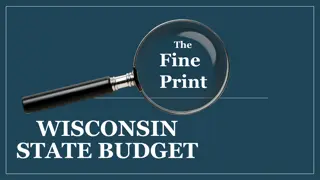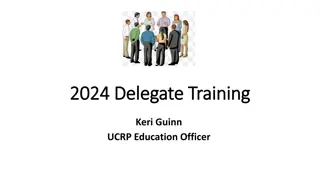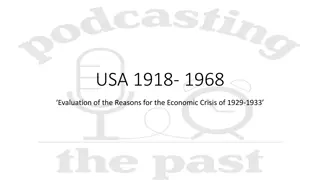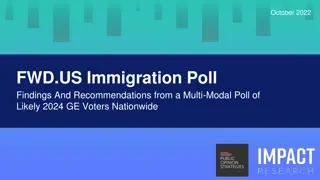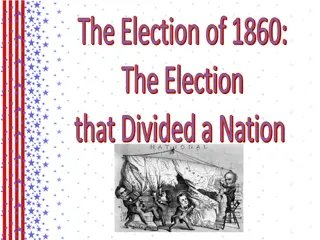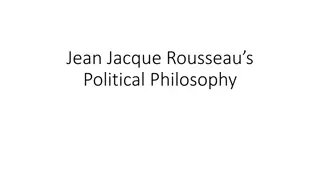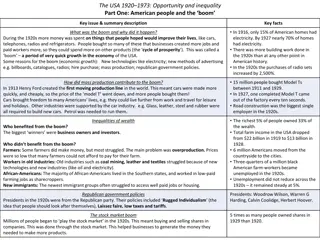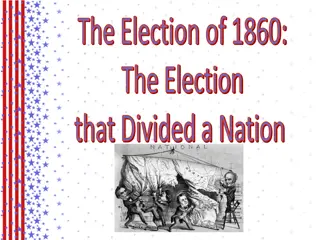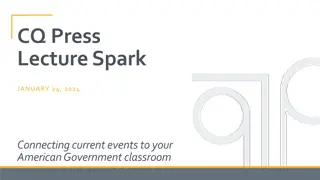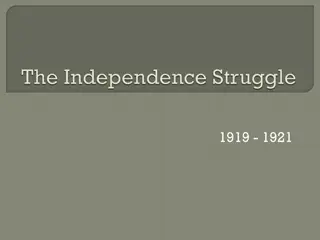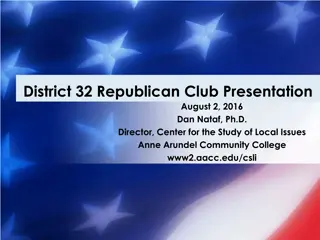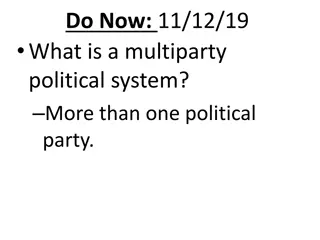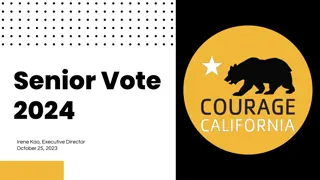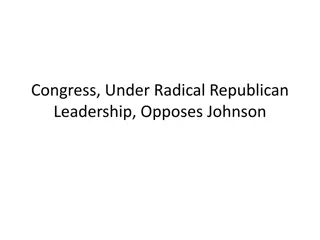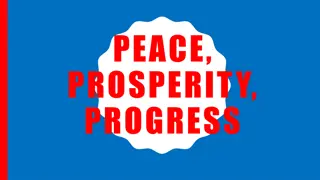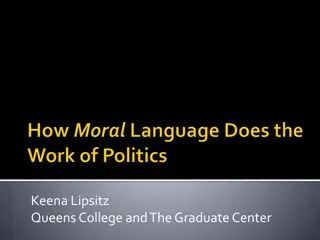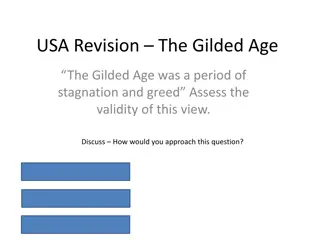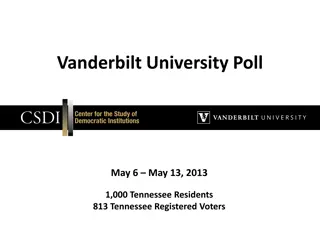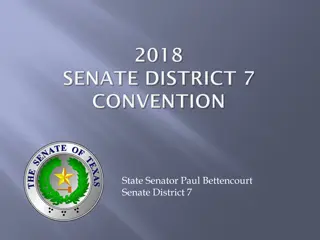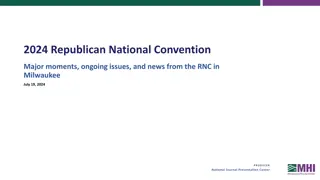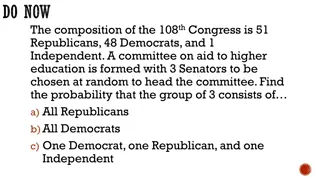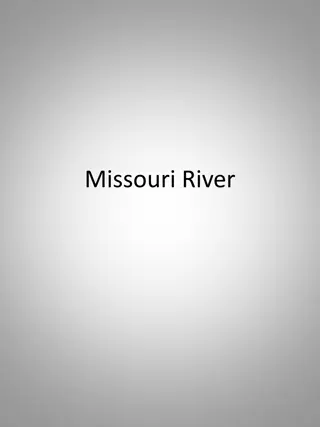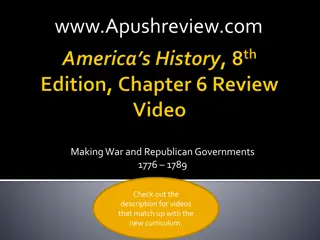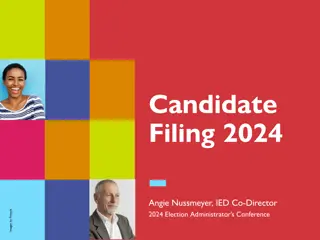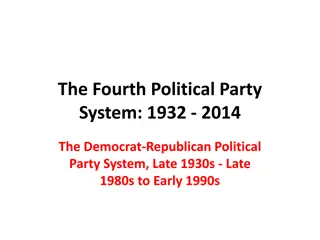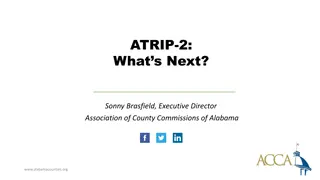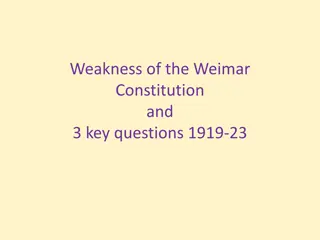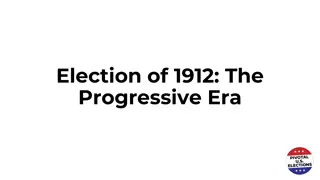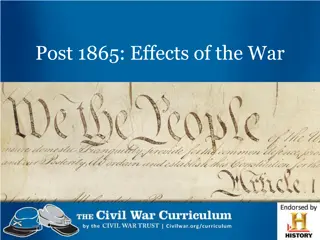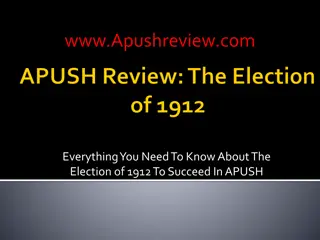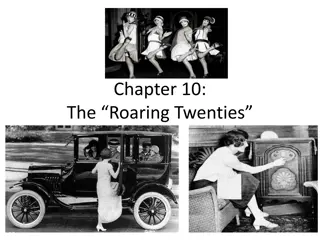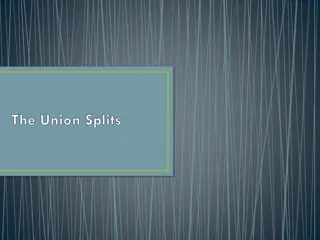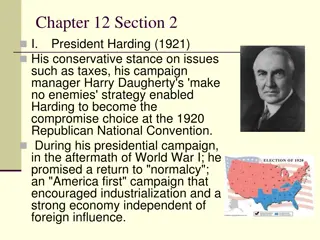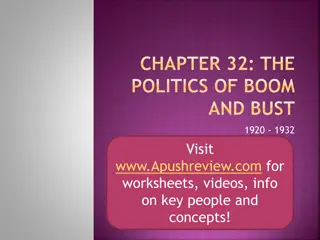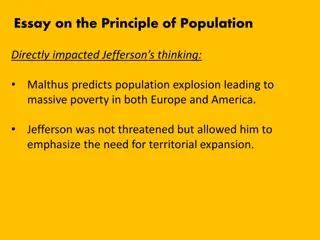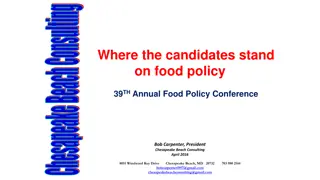Wisconsin State Budget Overview
Wisconsin's biennial state budget process is detailed, outlining how the budget is proposed, reviewed, and approved. The state relies on various tax sources for revenue and allocates funds predominantly to education, health care, and tax relief. The budget highlights the impact of Republican tax cut
2 views • 10 slides
Utah County Republican Party - Upcoming Events and Responsibilities
Stay informed about the Utah County Republican Party's upcoming events, including delegate training sessions, candidate meet-and-greets, and important party gatherings. Familiarize yourself with the party's constitution and bylaws, precinct officers' duties, and the role of precinct chairs in promot
1 views • 35 slides
Evaluation of Economic Crisis Causes in 1929-1933: Republican Policies and Factors
The economic crisis of 1929-1933 in the USA was influenced by various factors, including Republican government policies favoring laissez-faire capitalism, overproduction of goods, weaknesses in the banking system, international economic issues, and the Wall Street Crash. The prosperity of the 1920s,
0 views • 33 slides
Aristotle's Justification of Hierarchy and Republican Aspects of Citizenship
Aristotle's concept of citizenship involves a hierarchical structure where ruling and being ruled in turn is essential. He justifies this hierarchy by emphasizing the advantageous nature of ruling and being ruled. However, his views on citizenship in Greek city-states were limited to adult males, hi
4 views • 6 slides
Insights from October 2022 FWD.US Immigration Poll on Dreamers Legislation Support
Broad bipartisan support exists for legislation providing an earned pathway to citizenship for Dreamers and investment in border security among likely 2024 General Election voters nationwide. The key findings emphasize strong support for protecting Dreamers across party lines, including among Republ
1 views • 12 slides
The Election of 1860: A Divisive Campaign for the Future of the United States
The 1860 election was a significant moment in American history, marked by ideological divisions and the rise of Abraham Lincoln. The Republican Party, Southern Democratic Party, Democratic Party, Northern Democratic Party, and Constitutional Union all played crucial roles in shaping the outcome. The
1 views • 14 slides
Exploring Jean Jacques Rousseau's Political Philosophy
Jean-Jacques Rousseau, an influential political philosopher, was born in 1712 in Geneva, known for his works that inspired the French Revolution. His diverse talents ranged from writing to music composition. Rousseau's writings, including "The Social Contract" and "Emile," address themes of politica
0 views • 21 slides
The USA 1920-1973: Opportunity and Inequality Part One
In the booming 1920s USA, technological advancements, mass production, and Republican policies led to economic growth, with a significant focus on consumer goods like cars, radios, and refrigerators. While the era saw a rise in prosperity for some, including business owners and investors, others, su
0 views • 6 slides
The Election of 1860: A Historic Moment in American Politics
The election of 1860 was a pivotal moment in American history, marked by the rise of the Republican Party with Abraham Lincoln as its candidate. This election showcased the division in the Democratic Party, leading to the victory of Lincoln despite hostilities between the North and South. The Consti
4 views • 14 slides
Analysis of Presidential Race Shift to New Hampshire
The Republican presidential race has moved to New Hampshire following the Iowa caucuses, with former President Trump showcasing strong momentum. Nikki Haley emerges as a prominent challenger, while DeSantis suspends his campaign. The significance of Iowa and New Hampshire in the nomination process i
0 views • 5 slides
The Fight for Irish Independence: 1919-1921
Nationalists in Ireland embarked on a bold movement for independence from Britain between 1919 and 1921. This campaign saw Sinn Fein's passive resistance and the Irish Republican Army's guerrilla warfare tactics, as well as the establishment of the Dail Eireann and the election of an alternative gov
0 views • 38 slides
Analysis of 2016 Presidential Election: Polling, Match-ups, and Voting Intentions
Presentation by Dr. Dan Nataf at the District 32 Republican Club focused on the 2016 Presidential Election. It covers current state of the race, polling data, hypothetical match-ups between candidates like Trump, Clinton, and Sanders, favorability ratings, voting intentions in the primaries, and gen
0 views • 36 slides
Evolution of the American Political Landscape: A Historical Overview
Explore the development of the multiparty political system in the United States through the origins of the Democratic and Republican parties, tracing back to historical figures like Thomas Jefferson, James Madison, and Abraham Lincoln. Dive into the ideological spectrum, party histories, presidentia
0 views • 32 slides
Courage California 2024 Priorities and Initiatives
Courage California, a multi-issue political organization founded in 2007, focuses on voter education, issue advocacy, and voter outreach in California. With over 1.4 million members, the organization aims to flip seats from Republican to Democrat, support progressive ballot measures, and counter cor
2 views • 6 slides
Radical Republican Congress and Reconstruction Efforts
The Radical Republican-led Congress opposed President Johnson's lenient Reconstruction plans after the Civil War. They rejected Lincoln's approach, which led to the implementation of harsh Black Codes in the South. Congress pushed through laws like the Civil Rights Act of 1866 and the Freedman's Bur
0 views • 8 slides
Post-WWII America: Progress, Politics, and the Election of 1948
Lakewood, California's post-WWII boom symbolized the era's prosperity and status symbol of homeownership. Truman's Fair Deal faced Republican opposition, leading to postwar political shifts, including the 22nd Amendment and Taft-Hartley Act. The Election of 1948 saw Truman navigating Democratic fact
0 views • 20 slides
Analysis of Moral Language in Political Communication
Explore how Republican and Democratic elites use distinctive moral language and its impact on voters in the context of the 2012 election data. Discover the application of Moral Foundations Theory in understanding political differences in the United States and how moral intuitions influence public op
0 views • 13 slides
Examination of the Gilded Age in the USA
The Gilded Age in the USA was marked by political conservatism, economic growth driven by robber barons and corporations, and social challenges including urbanization, immigration, and nativism. The Republican Party's hegemony was influenced by big business support, but also faced opposition due to
0 views • 18 slides
Vanderbilt University Poll May 2013 Findings
Vanderbilt University conducted a poll in May 2013 among 1,000 Tennessee residents, focusing on various aspects such as approval ratings of state figures, knowledge of investigations, approval of Republican governors, federal figures, state government priorities, and support for guns. The poll resul
0 views • 25 slides
State Senator Paul Bettencourt - Republican Dominance in Texas
Despite the Blue Wave, Republicans outvoted Democrats by roughly 500,000 votes in the 2018 Primary in Texas, reaffirming its status as a solidly red state. Senator Bettencourt's Proposition 10, capping property tax increases at 4%, has garnered strong support statewide and in Harris County.
0 views • 10 slides
Republican National Convention 2024 Recap: Trump Attends, Vance Chosen as VP, Key Moments
The 2024 Republican National Convention witnessed key moments as former President Trump attended after a recent assassination attempt, receiving strong support. Trump officially unveiled Senator J.D. Vance as his Vice Presidential pick, signaling a shift in GOP dynamics. Vance, known for his pro-Tru
0 views • 7 slides
Understanding Probability Distributions in the 108th Congress
The composition of the 108th Congress includes 51 Republicans, 48 Democrats, and 1 Independent. A committee on aid to higher education is formed with 3 Senators chosen at random to head the committee. The probability of selecting all Republicans, all Democrats, and a mix of one Democrat, one Republi
0 views • 34 slides
Exploring Heights and Rivers in Nebraska
Discover the diverse elevations across Nebraska, from the soaring peaks of Scottsbluff and Harrison to the river landscapes of Missouri, Republican, and Platte. Explore the varying altitudes of cities like Omaha, Lincoln, and Grand Island, offering unique perspectives from 1,175 to 4,865 feet above
0 views • 34 slides
Politics and Corruption in the Gilded Age
The Gilded Age was marked by political machines, patronage, voter fraud, and a lack of antitrust enforcement. Presidents like Ulysses S. Grant were plagued by corruption scandals. The Republican Party was divided between Stalwarts and Half-Breeds, further complicating the political landscape. Leader
0 views • 23 slides
Revolutionary War and the Birth of Republican Governments in America, 1776-1789
The content discusses key events and figures during the Revolutionary War era, including the challenges faced by Patriots, victories at Saratoga, financial crisis, assistance from France, military strategies, the Treaty of Paris, and the role of women and minorities. It also touches on the influence
0 views • 10 slides
Election Filing Deadlines and Procedures for 2024
Detailed information on candidate filing deadlines and procedures for the 2024 election season, covering key dates for filing, deadlines for petitions, withdrawals, challenges, and ballot vacancies for Democratic, Republican, and Libertarian parties in Indiana.
0 views • 10 slides
Creating State Constitutions in Revolutionary America
After declaring independence from British rule in 1776, the American colonies embarked on forming new state governments. The focus was on protecting natural rights, establishing a republican form of government, and implementing limitations on governmental powers through constitutional frameworks. Th
0 views • 19 slides
Political Divisions and Purges in the Democrat-Republican Party System (1932-1938)
Divisions surfaced within the Democrat-Republican Party System in the late 1930s, marked by disputes over policies like Roosevelt's Court Packing Scheme and the Fair Labor Standards Act, leading to friction between Northern and Southern Democrats. President Roosevelt's attempt to purge conservative
0 views • 16 slides
Challenges Faced by ATRIP-2 and Lack of Legislative Commitment in Alabama
The Executive Director of the Association of County Commissions of Alabama discusses the hurdles encountered by ATRIP-2, highlighting opposition from mayors of major cities, concerns raised by opponents regarding project lists, and the lack of commitment from the Republican Caucus and Democrats. The
0 views • 15 slides
Weaknesses of the Weimar Constitution and Key Questions 1919-23
The Weimar Constitution had strengths such as democratic PR but weaknesses like Article 48 leading to dictatorship vulnerability. Additional weaknesses included a right-wing bias and a Republic dominated by anti-Republican personnel. The period also saw a revolution in 1918 due to military defeat. T
0 views • 12 slides
The Election of 1912: Competing Visions in American Society
The Election of 1912 during the Progressive Era showcased competing visions on how the federal government could address American society's challenges. Progressives sought reform, social control, and government intervention, impacting the Republican Party's split. Candidates included Wilson, Roosevel
0 views • 8 slides
Post-1865: Effects of the Civil War and Reconstruction Efforts
The post-Civil War era saw varied approaches to Reconstruction, including Lincoln's Ten Percent Plan, the Republican-controlled Congress's more stringent measures, Andrew Johnson's lenient policies, and the demands of the Radical Republicans. This period involved significant political and societal c
0 views • 6 slides
Election of 1912 and Its Impact on APUSH Students
Explore the dynamic Election of 1912 in US history, featuring William Howard Taft, Theodore Roosevelt, Woodrow Wilson, and Eugene Debs. Learn about the split in the Republican Party, Wilson's victory, Debs' Socialist impact, and the rise of the Progressive Party. Subscribe for more educational conte
0 views • 5 slides
The Roaring Twenties: Politics and Social Issues in 1920s America
The 1920s in America marked a period of significant political and social change. The nation saw a return to conservatism and isolationism after World War I, with the Republican Party in control. Nativism was on the rise, leading to restrictive immigration laws and controversial events like the Sacco
0 views • 22 slides
Abraham Lincoln and the Election of 1860
Abraham Lincoln, a self-educated Illinois frontiersman, entered national politics through debates against Stephen Douglas in 1858. The 1860 Democratic Convention faced division over slavery issues, leading to the emergence of multiple candidates. The Republican Convention strategically nominated Abr
0 views • 9 slides
President Harding and His Administration: A Conservative Era in American Politics
President Harding, known for his conservative stance on taxes and his "America first" campaign, was a compromise choice at the 1920 Republican National Convention. Despite calming the nation with his words, his administration faced numerous scandals. His policies, like the Fordney McCumber Tariff, a
0 views • 8 slides
The Politics of Boom and Bust 1920-1932: A Decade of Turmoil
Exploring the era from 1920 to 1932, this content delves into the shifting political landscape characterized by prosperity and corruption. It covers the return of the Republican Old Guard, government policies of the 1920s, aftermath of World War I, reduction of militaries, hiking tariffs, and scanda
0 views • 20 slides
Impacts of Historical Events on Jefferson's Governance
Malthus's prediction on population growth and poverty influenced Jefferson's emphasis on territorial expansion. His reversal of Federalist policies aimed to restore Republican ideals. The Louisiana Purchase was motivated by securing an agrarian society. Marbury vs. Madison established judicial revie
0 views • 19 slides
Republican National Convention 2012 Food Policy Stance
The 2012 Republican National Convention platform emphasizes the importance of protecting farmers, agricultural production, and exports in the U.S. economy. It discusses issues such as the cost of food under current policies, uncertainties in agriculture, federal programs to manage risk, USDA's role
0 views • 11 slides
TFRW Club Achievement Award and Its Importance
The Texas Federation of Republican Women (TFRW) Club Achievement Award aims to bring more women into the organization, increase political activism among Republican women, encourage them to run for political offices, promote informed voting among Republicans, and foster voter turnout within the party
0 views • 23 slides
